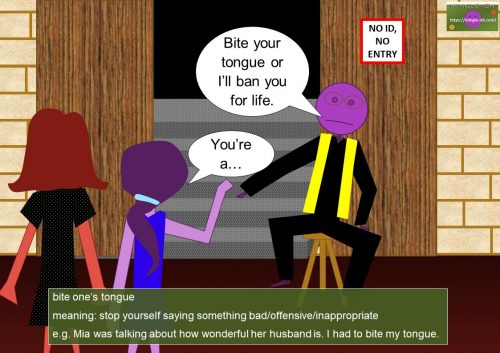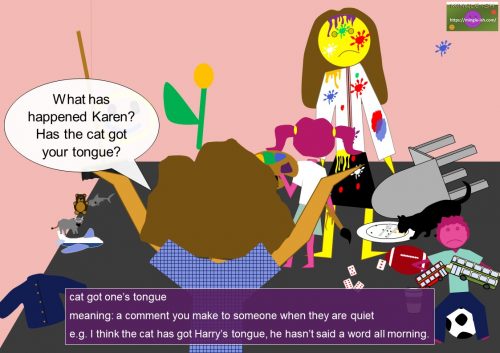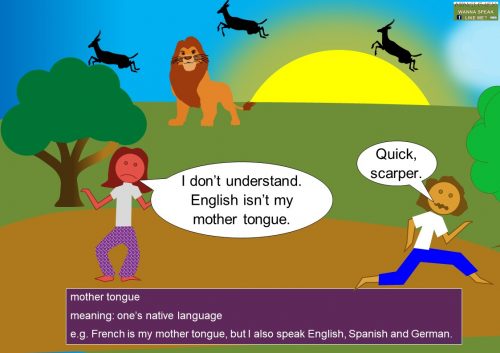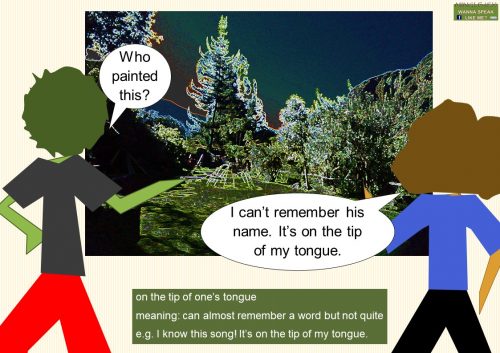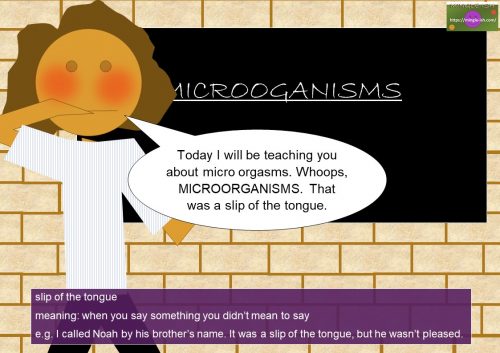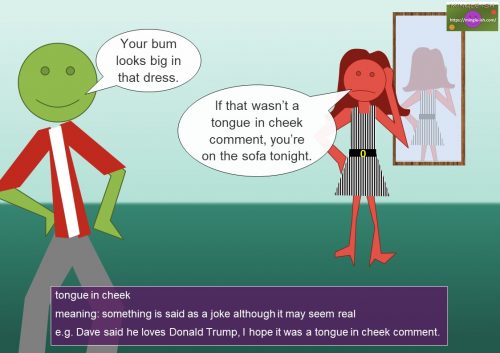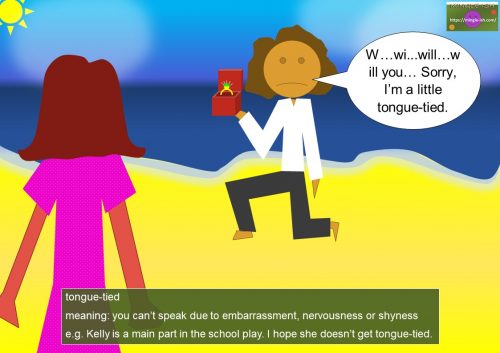at the tip of one’s tongue
on the tip of one’s tongue
Almost spoken; at the point of being said.
It was at the tip of my tongue to tell him, when the phone rang.
John had a rude answer on the tip of his tongue, but he remembered his manners just in time.
Almost remembered; at the point where one can almost say it but cannot because it is forgotten.
I have his name on the tip of my tongue.
«His name is on the tip of my tongue,» Tom said. «It will come to me in a minute.»
bite one’s lips
bite one’s tongue
To force oneself to remain silent and not to reveal one’s feelings.
Заставить себя или кого-то не показывать свои чувства, оставаться молчаливым.
I had to bite my lips when I heard my boss give the wrong orders.
It was difficult for me not to react; I had to bite my tongue.
Для меня было трудно не среагировать, поэтому пришлось прикусить язык.
cat got one’s tongue
cat get one’s tongue
You are not able or willing to talk because of shyness. Usually used about children or as a question to children.
Быть не способным ясно говорить из-за стеснения; «проглотить язык». Обычно используется в разговоре о детях или в вопросах к детям.
Tommy’s father asked Tommy if the cat had got his tongue.
The little girl had a poem to recite, but the cat got her tongue.
He sounds like cat’s got his tongue.
Он говорит очень неясно, непонятно.
The cat suddenly got my tongue in the middle of my speech. Thank God, some of the students began to ask me questions.
Я вдруг «проглотил язык» посередине своей речи. Слава Богу, кое-кто из студентов начал задавать мне вопросы.
find one’s tongue
find one’s wings
find one’s feet
To become able to use (some power of the body or mind.)
In the program for the parents, John was nervous and could not speak at first; then he found his tongue.
The young bird had just found its wings.
The baby was just beginning to find his feet.
The question surprised him, and it was a minute before he found his tongue.
hold one’s tongue
To be silent; keep still; not talk. May be considered rude.
Быть тихим, молчаливым.
Если используется в повелительном наклонении, то имеет оттенок грубости или фамильярности.
The teacher told Fred to hold his tongue.
If people would hold their tongues from unkind speech, fewer people would be hurt
Why don’t you hold your tongue?
Почему бы тебе не придержать язык за зубами?
keep a civil tongue in one’s head
To be polite in speaking.
He was very angry with his boss, but he kept a civil tongue in his head.
The bus driver began yelling at the woman and she told him to keep a civil tongue in his head.
lose one’s tongue
To be so embarrassed or surprised that you cannot talk.
The man would always lose his tongue when he was introduced to new people.
slip of the tongue
slip of the lip
The mistake of saying something you had not wanted or planned to say; an error of speech.
No one would have known our plans if Kay hadn’t made a slip of the tongue.
She didn’t mean to tell our secret; it was a slip of the lip.
In Venomous Tongues, Bardsley also argues that texts on the evils of the tongue constitute «a discourse,» defined as «a set of habits of thought and speech familiar to much of the population» (3).
In recent years, some computer image processing technologies have been used in tongue diagnosis in the Chinese traditional medicine.
The statistics for the population mother tongue is similar to that for ethnic composition at the beginning of 2018 ethnic Latvians accounted for 62.2 percent of the population.
In some babies, this does not cause any problems, but in others, it can restrict the tongue‘s movement, making it harder to breastfeed.
A happy, healthy tongue tends to be pink and dotted with small nodules, and if not, something might be up.
‘The culture of teachers punishing their students for speaking their mother tongue must stop.
You should also see your doctor if you have an unusually pale tongue, as Okoye explains this can be a sign of a vitamin or mineral deficiency: «This is common in anaemia sufferers, or after a long-standing disease where the immune system might be weak.»
In reality, we taste different flavours using taste buds spread across all parts of the tongue.
The tongue, floor of mouth and lip are the commonest site which are affected.1 The origin of the affected sites of tumours in oral cavity is the stratified squamous epithelium.
In age old times, tongue tie release was done by midwives who tore the frenulum with their nails which was often dirty.
The human tongue has a complex architecture consistent with its five crucial roles: breathing, sucking, swallowing, chewing, and speech.
A 37-year-old man was left screaming in pain after a crab grabbed his tongue as he tried to play around with it.
The findings come from a large, population-based study that identified variations in the tongue microbiota among community-dwelling elderly adults in Japan.
The idea of cutting your tongue in half may make your skin crawl, but for some people it’s a look to be desired.
Summary: The mother tongue of each member of a household need not necessarily be the same
Английское слово «tongue» на русский переводится как «язык». Но всегда ли его значение так однозначно? Давайте рассмотрим интересные английские выражения и идиомы с «tongue», которые полезно запомнить и использовать в своей разговорной английской речи.

Популярная английская идиома, которую используют, чтобы спросить, почему человек молчит.
What’s the matter? Cat got your tongue?
В чем дело? Ты язык проглотил?

У кого-то хорошо «подвешен» язык? Просто у него «Silver tongue».
I see you haven’t lost your silver tongue.
Я вижу, что ты не растерял своего красноречия.

Еще одна английская идиома, используя которую, мы можем попросить кого-то промолчать или сохранить тайну.
I know you want to yell at him, but you’ll just have to bite your tongue.
Я знаю, что ты хочешь накричать на него, но тебе придется прикусить язык.

Случайно поставили неправильное ударение в слове или произнесли что-то неверно? Английская идиома «Slip of the tongue» поможет вам извиниться за маленькую ошибку в речи и быстро исправиться.
Oh, sorry, it was the slip of the tongue.
Ой, извините, это была оговорка.

Используем фразу «On the tip of my tongue», когда не можем вспомнить какое-либо слово или чье-то имя, но мы точно знали это в прошлом.
Her name is on the tip of my tongue.
Ее имя вертится у меня на языке.

My mother tongue is Russian.
Мой родной язык — русский.
What is a tongue?
The tongue is the muscle inside the mouth that helps us taste and talk. The plural is ‘tongues’.
FUN FACT – The vowel ‘o’ is pronounced more like the vowel ‘u’. It’s another one of those little quirks of the English language. Vowels can be pronounced in many different ways. You can find out the rules here.
Let’s look at some popular body idioms that contain the word ‘tongue’.
- bite one’s tongue
meaning – stop yourself saying something bad/offensive/inappropriate
example – Mia was talking about how wonderful her husband is. I had to bite my tongue. - cat got one’s tongue
meaning – a comment you make to someone when they are quiet
example – I think the cat has got Harry’s tongue; he hasn’t said a word all morning. - mother tongue
meaning – one’s native language
example – French is my mother tongue, but I also speak English, Spanish, and German. - on the tip of one’s tongue
meaning – can almost remember a word/phrase/name etc. but not quite
example – I know this song! It’s on the tip of my tongue. - slip of the tongue
meaning – say something you didn’t mean to say
example – I called Noah by his brother’s name. It was a slip of the tongue, but he wasn’t pleased. - tongue in cheek
meaning – something is said as a joke although it may seem real
example – Dave said he loves Donald Trump; I hope it was a tongue in cheek comment. - tongue-tied
meaning – you can’t speak due to embarrassment, nervousness, or shyness
example – Kelly is a main part in the school play. I hope she doesn’t get tongue-tied.
tongue idioms list with pictures
Here’s some real life picture examples.
You can download a table of ‘tongue’ idioms and expressions below.
If you’ve enjoyed this page, don’t forget to check out some more body idioms by clicking on the links below.
«If a man cheated you once — he’s a swindler, if he did it twice — you are a fool.» — Если человек обманул Вас — он мошенник, если он обманул вас дважды, Вы — дурак
Friday [ʹfraıdı] , 14 April [ʹeıprəl] 2023
Транскрипция слов и перевод текста
-
Вы здесь:
- Главная
- Транскрипция и перевод
Фразы, идиомы, фразовые глаголы, сленг , примеры предложений
Идиоматические выражения,фразы
|
a ready wit/tongue
1. за словом в карман не лезть; острый на язык |
|
bite one’s tongue
1. прикусить язык (промолчать) |
|
give smb a tongue-lashing
1. отчихвостить (отругать) |
|
hold one’s tongue
1. держать язык за зубами; помалкивать; придержать язык |
|
loosen one’s tongue
1. развязать язык (под влиянием алкоголя) |
|
on the tip of one’s tongue
1. вертеться на языке |
|
tongue-tied (adj)
1. косноязычный; язык заплетается |
|
at the tip of one’s tongue
«на кончике языка», почти уже сказанный |
|
Better to stumble than make a slip of the tongue
Лучше споткнуться, чем оговориться; ср.: Слово – не воробей, вылетит – не поймаешь |
|
Cat got your tongue?
Nothing to say? |
|
keep a civil tongue in one’s head
держаться в рамках приличия, быть вежливым; вежливо, учтиво говорить, избегать грубостей |
|
keep a still tongue in one’s head
молчать, помалкивать; отличаться молчаливостью; держать язык за зубами |
|
The tongue speaks, but the head does not know
The tongue speaks, but the head doesn’t know |
|
The tongue speaks, but the head doesn’t know
Голова не знает, что язык болтает |
|
tongue in cheek
with tongue in cheek |
|
tongue speaks, but the head does not know, The
Голова не знает, что язык болтает |
|
tongue speaks, but the head doesn’t know, The
Голова не знает, что язык болтает |
|
wag one’s tongue
чесать языком |
|
with tongue in cheek
иронически; в шутку; несерьезно; дурачась |
В английском языке есть идиомы, в которых упоминается главный орган нашего общения, то есть язык. Дословный перевод может подсказать нам значение всего устойчивого выражения, однако это не всегда является верным способом узнать, что же оно обозначает на самом деле.
cat gets one`s tongue (досл. «кот хватает чей-то язык»)
Бывает, что при разговоре или во время публичного выступления вы понимаете, что все слова и мысли вылетели у Вас из головы, и вы стоите в замешательстве перед слушателями, не зная, как продолжить свою речь. Англичане объясняют такую растерянность внезапным появлением коварного кота, который вдруг лишает Вас собственного языка.
Например:
The cat suddenly got my tongue in the middle of my speech. Thank God, some of the students began to ask me questions.(Я вдруг «проглотил язык» посередине своей речи. Слава Богу, кое-кто из студентов начал задавать мне вопросы.)
tongue-in-cheek (досл. «с языком за щекой»)
Замечали ли Вы, что люди начинают прикусывать язык, когда они хотят схитрить или подшутить над Вами? Существование этого выражения говорит об известной наблюдательности англичан за человеческими привычками.
Например:
His tongue-in-cheek compliment concerning my evening dress made me embarrassed. (Его насмешливый комплимент по поводу моего вечернего платья заставил меня смутиться)
speak with a forked tongue (досл. «говорить с раздвоенным языком»)
Человека, убеждающего людей в одном, но подразумевающего при этом совсем другое, мы назовем двуличным. В Англии их называют говорящими с раздвоенным языком.
Например:
This man is always speaking with a forked tongue and nobody trusts him. (Этот мужчина всегда лжет и ему никто не доверяет)
To have a loose tongue (досл. «иметь свободный/растянутый язык»)
О тех, кто болтает без умолку, или же любит выбалтывать чужие секреты, говорят, что у них «растянутые языки».
Например:
He has a loose tongue. Be careful and do not share your secrets with him. (Он настоящий болтун. Будь осторожен и не делись с ним своими секретами)
Vocabulary:
ask question – задавать вопрос
be careful – будь осторожен
began – начал, начали
cat – кот, кошка
cheek – щека
compliment – комплимент
concerning – касательно
do not share – не делись
evening dress – вечернее платье
forked— раздвоенный
got – схватил
him – ему
in the middle of — в середине
is always speaking — всегда говорит
loose – растянутый, свободный
make embarrassed – заставить смутиться
me – мне
nobody – никто
secret — секрет
some – кое-кто, некоторый
speech – речь, выступление
suddenly – вдруг
Thank God – Слава Богу
this man – этот мужчина
tongue — язык
trust – доверять
with him – с ним
English Idioms «Tongue»
Сегодня мы рассмотрим идиомы со словом «tongue». Мы узнаем, как эти идиомы переводятся на русский язык и как могут употребляться в речи.
cat gets one`s tongue (досл. «кот хватает чей-то язык»)
Бывает, что при разговоре или во время публичного выступления вы понимаете, что все слова и мысли вылетели у Вас из головы, и вы стоите в замешательстве перед слушателями, не зная, как продолжить свою речь. Англичане объясняют такую растерянность внезапным появлением коварного кота, который вдруг лишает Вас собственного языка.
Example:
The cat suddenly got my tongue in the middle of my speech. Thank God, some of the students began to ask me questions.
Я вдруг «проглотил язык» посередине своей речи. Слава Богу, кое-кто из студентов начал задавать мне вопросы
tongue-in-cheek (досл. «с языком за щекой»)
Замечали ли Вы, что люди начинают прикусывать язык, когда они хотят схитрить или подшутить над Вами? Существование этого выражения говорит об известной наблюдательности англичан за человеческими привычками.
Example:
His tongue-in-cheek compliment concerning my evening dress made me embarrassed.
Его насмешливый комплимент по поводу моего вечернего платья заставил меня смутиться.
speak with a forked tongue (досл. «говорить с раздвоенным языком»)
Человека, убеждающего людей в одном, но подразумевающего при этом совсем другое, мы назовем двуличным. ВАнглии их называют говорящими с раздвоенным языком.
Examples:
This man is always speaking with a forked tongue and nobody trusts him.
Этот мужчина всегда лжет и ему никто не доверяет.
To have a loose tongue (досл. «иметь свободный/растянутый язык»)
О тех, кто болтает без умолку, или же любит выбалтывать чужие секреты, говорят, что у них «растянутые языки».
Example:
He has a loose tongue. Be careful and do not share your secrets with him.
Он настоящий болтун.Будь осторожен и не делись с ним своими секретами.
Успехов, Дания
Learn English with Steve Ford-Tongue Idioms-Phrasal Verb
Hello! Hello! Hello! — Привет! Привет! Привет!
And welcome — и добро пожаловать to Learning English TV — на уроки английского на TV with Steve Ford Lesson 4 — со Стивом Фордом — урок4.
This week we are going to — на этой неделе мы собираемся be talking — поговорить about Tongue idioms — об идиомах про язык.
So let’s go – итак, давайте начнем.
My first question — мой первый вопрос comes from Aymen — поступил от Оумена from Saudi Arabia – из Саудовской Аравии!
Aymen would like — Оумен хотел бы, more clarification – большего разъяснения about ‘to speak with a forked tongue’ — ‘говорить с разветвленным языком’.
He says, — он говорит, would it be correct, — что это было бы правильно, to say that sometimes — сказать, что иногда for example a salesman, — например, продавец, or a salesperson such as a car salesperson, — или такой, как продавец автомобилей, could speak to you with a forked tongue — могли говорить с вами с разветвленным языком?
Well I guess — хорошо я предполагаю, that depends — что зависит on your own experience there Aymen — от вашего собственного опыта, Оумен.
I have heard stories of people who were being guaranteed that they were buying good used car when in fact, a week later or two weeks later the car ended up being a lemon.
The car in fact was not in condition at all. Your second question to me is whether there is another idiom with parts of the body related to ‘forked tongue’ that could be used in the same way. And there certainly is, you could say ‘to be talking out of both sides of your mouth’.
In both cases, it means that somebody is telling you one thing and actually they’re saying an opposite thing at the same time.
So they’re talking out of both sides of their mouth.
Quite often we hear about these stories of antiquity of people who are manipulated, who are ‘talked into something’ by a snake who has a forked tongue and is able to ssseduce somebody and manipulate then in order to get them to do what that snake wanted he or she to do. To be speak with a forked tongue, be careful!
My next question comes from Rafael from Poland. Rafael would like to know if it is essential to practice tongue twisters in order to improve your pronunciation in English. I don’t think so necessarily Rafael of course if you are able to do it, great! Please keep in mind that there are a lot of native speakers who have trouble saying tongue twisters and this is why we make a game out of it. So if you are racking your brain trying to say, ‘she sells seashells by the seashore’ 3 times, don’t worry about it.
My next question comes from Donya from Iran who presently lives in the United States.
Her problem is that Donya often has to give presentations to a large group of people, sometimes as many as 200 , 300 people giving a power point presentation.
And at times she feels like she gets a little tongue-tied even when she is reading from a script or she’s reading from the screen. She wanted to know if there’s any way that she can improve that.
Well thank you very much for your question Donya.
The first thing that I would like to point out is ‘to be tongue-tied’ is when you have difficulty pronouncing words and you start to get stuck.
You start to trip over your words. There are some ways to solve that. In Peppy Pronunciation 1 and 2 I do give some good tips about trying to use the correct vowel sounds. Normally with vowel sounds, word stress and stress on the correct syllable.
Those three things, when you become more aware of them, will help you to identify your errors, start to do some self-correction and then you will build more self-confidence and as a result, you will become less and less tongue-tied as you are giving your power point presentations.
So, i hope that answers your question.
My next one is ‘on the tip of my tongue’. What a minute, I did that one actually…in my mouth idioms video……mouth idioms…mouth idioms flashback
OK, so you remembered with me ‘on the tip of my tongue’ so I don’t need to explain it again, how convenient!
OK here come the extra tongue idioms:
My first extra idiom is ‘a slip of the tongue’ we have many words that can be synonymous with that including some phrasal verbs using slip. You could say when something slips out or when you slip up
according to psychologists we quite often will have a slip of the tongue. What this means, well here is an example of a dialogue
Mary: Hi John, what time would you like to go over the project today?
John: How about sex? Oops, sorry, I meant to say six!!!!!
Yes John just had a slip of the tongue and at the same time he put his foot in his mouth. You’ll be sleeping in the doghouse tonight Johnny!
My next extra idiom is to give someone a tongue lashing.
To lash, literally means to whip(crack), to whip, to whip, to whip, yes to give someone a tongue lashing in a figurative sense means to angrily or to whip someone with your tongue(words).
Sometimes it’s difficult to get a tongue lashing at school or work from a superior when it is not your fault.
An anecdote that comes to mind long ago when I was teaching a student from Germany, he(add in he) mentioned to me that he had a supervisor who would quite often give him a tongue lashing when in fact he had done nothing wrong. And I had asked him, “How were you able to deal with such a tongue-lashing and he said that every day after work he would go running in the forest. . Кстати, появился новый сайт о личных кабинетах: справочник личных кабинетов, интернет банков
So here is a good example of someone who received a tongue lashing and he was able to take that negative situation and transform it into a positive situation by running off his anger so that’s a great little anecdote to remember tongue-lashing.
My next extra idiom is ‘to roll off your tongue’ when the words or something rolls off your tongue. This is an antonym for tongue-tied.
This is where everything starts to flow correctly.
It’s like you are conducting an orchestra and everything flowing likes music( classical music) Yes song writers have this secret, they know how to make words flow together.
My last extra idiom for tongue is to speak in a civil tongue. I would like you to remember with me my pyramid of formality.
With that pyramid of formality we can go all the way from street talk to formal or academic English.
So you could start at the street talk or slang levekland say, “ Hey What’s up” ( Hey Wuzup) You can move to the semi-formal level and say “ Hi how’s it going” You can move up to the formal level and say “ Hello it’s a pleasure to meet you” and you can move to the very top of the pyramid seldom used but I have heard that it is used in some circles “ how do you do?”
So you can see with the different levels of formality, to speak in a civil tongue/keep a civil tongue would be right at the top of formal or academic English
A little footnote that I would like to add here is that many students will write me a message asking, “ Are you OK?” “Hi, are you OK?” I would like to point out that in North America this would be incorrect as a greeting. When you say, “ Are you OK?” It implies that there is something wrong. “ Are you OK? Are you sick? What happened to you?” So be very careful what greeting you are using.
Other common misconception is “ Howdy” Do all North Americans say “ howdy partner’. No, this is used only in certain regions of the US.
Don’t try using it everywhere you go in North America or they might laugh at you. ( hahahahaha). My question for UK residents, would be the same as using the common London greeting “ Alright mate?” for the entire UK.
Well that’s it for our lesson today. I hope that you enjoyed yourself as much as I did. I’m sure that I will set many tongue wagging talking about these tongue idioms in comments below this video. I look forward to our next lesson next time.
Please send me any of your questions
Bye! Bye!


